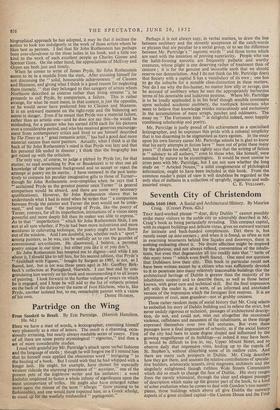Partridge on the Wing
HERE we have a man of words, a lexicographer, exercising himself very pleasantly as a nian of letters. The result is a charming, occa- sionally irritating, but nearly always readable series of essays. First of all there are some pretty etymological " vignettes," and then a set of more considerable studies.
I read with grateful joy Mr. Partridge's attack upon verbal fashions and the language of snobs ; though he will forgive me if I remind him that he himself once applied the obnoxious word " intriguing " to the binding of a book. But I could wish that he had whipped with a longer lash. He might, for example, have chosen for especially virulent ridicule the alarming prevalence of " mystique," one of the present pets' of the highbrow writer and his imitators : a word foolishly employed to fasten a whole infinity of significance upon the most unimportant of trifles. He might also have enlarged rather more upon the misuse of the term " allergic " (now ceasing to be fashionable), and one would, have expected him, as a Greek scholaj, to stand up for the woefully mishandled " protagonist."
Perhaps it is not always easy, in verbal matters, to draw the line between snobbery and the slovenly acceptance of the catch-words or phrases that are peculiar to a social group, or to see the difference between Mr. Partridge's " narcotic words " and those terms which are used with the intention of proving superiority. People who use the habit-forming narcotic are frequently pathetic and worthy creatures, whose plight is one deserving rather of treatment than of censure ; it is for the genuine and incurable snob that we should reserve our denunciation. And I do not think (as Mr. Partridge does) that Society with a capital S has a vocabulary of its own ; one has to go the suburbs for a notable class-distinction in these matters. Nor do I see why the fox-hunter, no matter how silly or savage, can be accused of snobbery when he uses the appropriately barbarous terms of his detestable and ludicrous pastime. Where Mr. Partridge is to be loudly applauded is in his brief though sensible comments upon secluded academic snobbery, the toothpick historians who seem to believe that knowledge resides miraculously and exclusively in the accumulation of mere scraps, patches and oddments. The essay on " The Fortunate Isles " is delightful indeed, most happily combining scholarship and poetry.
Mr. Partridge is justly proud of his achievement as a specialised lexicographer, and he expresses this pride with a colonial simplicity that is too disarming to be stigmatised as mere egoism. In the essay upon his own literary career Mr. Partridge admits he is glad to know that his early attempts in fiction have " been out of print these many years " (I share his relief), but rightly says that the writing of fiction is " salutary to all authors," even to those who, like himself, were intended by nature to be etymologists. It would be most unwise to cross pens with Mr. Partridge, but I am not sure whether the long study on " Articled Nouns," a solid conglomerate of philological information, ought to have been included in this book. From the common reader's point of view it will doubtless be regarded as the only slice of dullness in a collection of sprightly, ingenious and well-


















































 Previous page
Previous page